Teaching Innovation and Pedagogy Spotlight (TIPS): A Recognition of Pedagogical Innovation in the SU Classroom
The TIPS recognition is a yearly award given to a tenure track or tenured faculty member in each college and one faculty member not in a college who demonstrates outstanding evidence of one of the following criteria in an undergraduate or graduate course: communicating course expectations, focusing on students’ sense of belonging, and/or incorporating innovative learning strategies.
Why TIPS:
- To showcase innovating pedagogical practices within course design that enhance course level communication, belongingness, and students’ learning outcomes.
- To recognize faculty-led teaching and learning experiences in SU classrooms that impact students’ success.
- To share ideas across campus that incorporate purposeful and pragmatic pedagogical practices.
- To award each TIPS recipient a $500.00 travel or course grant for professional
TIPS Award Criteria
Communicating Course Expectations
Focusing on Student’s Sense of Belonging
Incorporating Innovative Learning Strategies
Alison Feeney and David Wildermuth

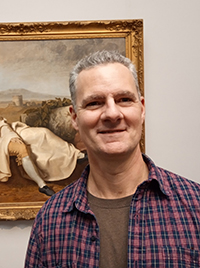
GEO 490/GER 190- German Beer Culture:
Products, Practices, and Perspectives
(Incorporating Innovative Learning Strategies)
Dr. Alison Feeney and Dr. David Wildermuth, faculty in the Geography and Earth Science Department and the Department of Global Languages and Culture, developed a shared course to provide students with a compulsory international travel experience, the ability to speak another language, and the opportunity to gain a deeper understanding of brewing heritage within geographic, physical, cultural, and historical factors that have contributed to the development and popularity of beer in Germany.
Three innovative learning strategies are aligned in throughout the course competencies that:
- Meets students’ program needs in two different departments and areas of study; and
- Explores the rich culture and scientific aspects of beer through two phases: pre-travel intensive scholarly investigations and post-spring break reflections in the form of a travel journal that analyzed and synthesized their scholarly findings and travel experiences to contextualize perspectives related to beer culture in Germany, Austria, and Czechia, and compared it to the United States; and
- Provides students with criteria and model assignments that served as templates for students’ learning.
Cheryl Slattery
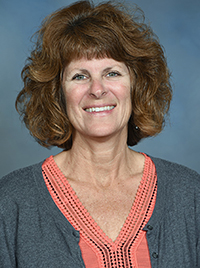
RDG 443- Reading Measures and Interventions
(all TIPS award criteria)
Dr. Cheryl Slattery, a literacy expert within the Teacher Education Department (TED), builds a strong sense of belonging among the pre-service teachers enrolled in her course, including coordinating a four-credit practicum experience within the Shippensburg Area School District that:
- Connects the pre-service teachers with children from Grace B. Luhrs University Elementary School (GBLUES) as part of weekly literacy interventions; and
- Aligns course competencies and literacy content with recent mandates related to the Science of Reading outlined by the Pennsylvania legislator, namely revisions to Chapter 49, as part of data informed instructional practices to enhance pre-service teachers’ knowledge, skills, and dispositions; and
- Implements a framework to involve a community of learners with the task of mastering specific parts of literacy instruction while also relying on a collaborative structure within each lesson’s delivery.
Course related evidence of Communicating Course Expectations, Focusing on Student’s Sense of Belonging, and Incorporating Innovative Learning Strategies (TIPS criteria) are evident in RDG 443 course.
Allan Tulchin
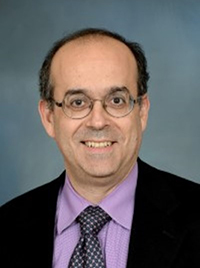
HIS 105- Foundations of Global Cultures
(all TIPS award criteria)
Dr. Allan Tulchin is a faculty member in the History and Philosophy Department. His interpretation of HIS 105 as a required general education core course for all students includes three components for fostering student success, specifically mapping explicit course communication expectations, building a sense of belonging, and incorporating innovative teaching and learning strategies, including:
- Implements a comprehensive scope and sequence list of all key terms and concepts covered in the course within a structure of focus questions for each day designed to facilitate students’ word knowledge in acquiring new information and mastering new concepts; and
- Assigns student groups to: discuss focus questions, take on a role and responsibility within the group, and facilitate lively class discussions.
Furthermore, Dr. Tulchin examined his exam data and determined that students who prepared explicit notecards scored on average 15 points higher than those who didn’t. Plus, he reviewed and graded the students’ notecards as part of the course outcomes and found common patterns of missing information which he was able to address with the students as feedback.
Tom Gibbon
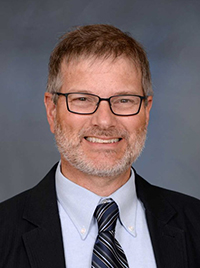
ECC 423- Effective Instructional Strategies for Students with Exceptionalities
(Incorporating Innovative Learning Strategies)
Dr. Gibbon, a faculty member in the Special Education and Educational Leadership Department, exemplifies innovative teaching in the way in which his course assignments reflect the critical content and practical skills an effective teacher will use every day in the inclusive classroom.
Dr. Gibbon:
- uses hands-on learning strategies and assignments, such as having students create and adapt a lesson plan to accommodate students with disabilities in the general education classroom; and
- incorporates student feedback into his class meetings in ways that helped students build an understanding that deepened their knowledge and skills.
One student noted that he would pull student responses and share them with the class. He showed that he really cared about the work that we did in his class and took the time to read through our assignments. Another thing to note about him as a professor is the applicable assignments to the field. He had us create a lesson plan and then use student IEPs to accommodate for. This assignment is something that I will do frequently in the field as I create lessons and accommodate to students in my future classroom. The way he taught this course made it applicable to the field so that I was learning things that I will be doing on a regular basis once I become a teacher. Dr. Gibbon is great at building relationships with his students. He makes sure to get to know his students and makes them feel valued.
Matthew Shupp
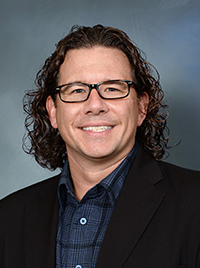
CNS 710 – Instructional Theories and Pedagogy
(Incorporating Innovative Learning Strategies)
Dr. Matthew Shupp, a professor in the Counseling Department, is recognized for his graduate level course which includes philosophical, theoretical, methodological, and practical explorations of education, adult learning, and counselor education.
Dr. Shupp:
- incorporates core texts to emphasize established best practices in counselor education and online learning; and
- provides supplemental readings and media also provide opportunities for critical thinking, especially as it pertains to culturally responsive and socially just education; and
- requires doctoral students to provide a 20-minute presentation to their peers on their course, course design, and syllabus creation.
Essentially, the overall outcome from CNS 710 – is two-fold: 1. Students not only learn the “why” behind effective teaching strategies, but 2. Students also leave the class with effective practical skills when teaching opportunities arise within and outside of our department.

